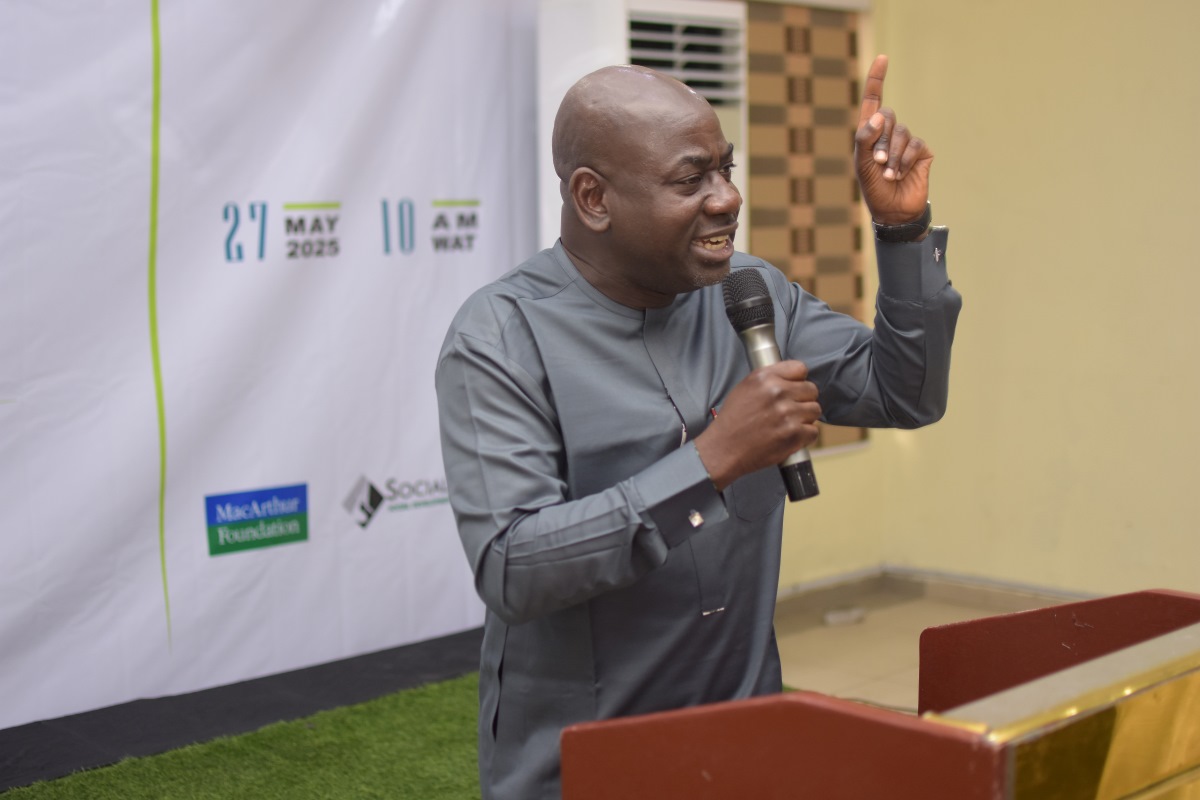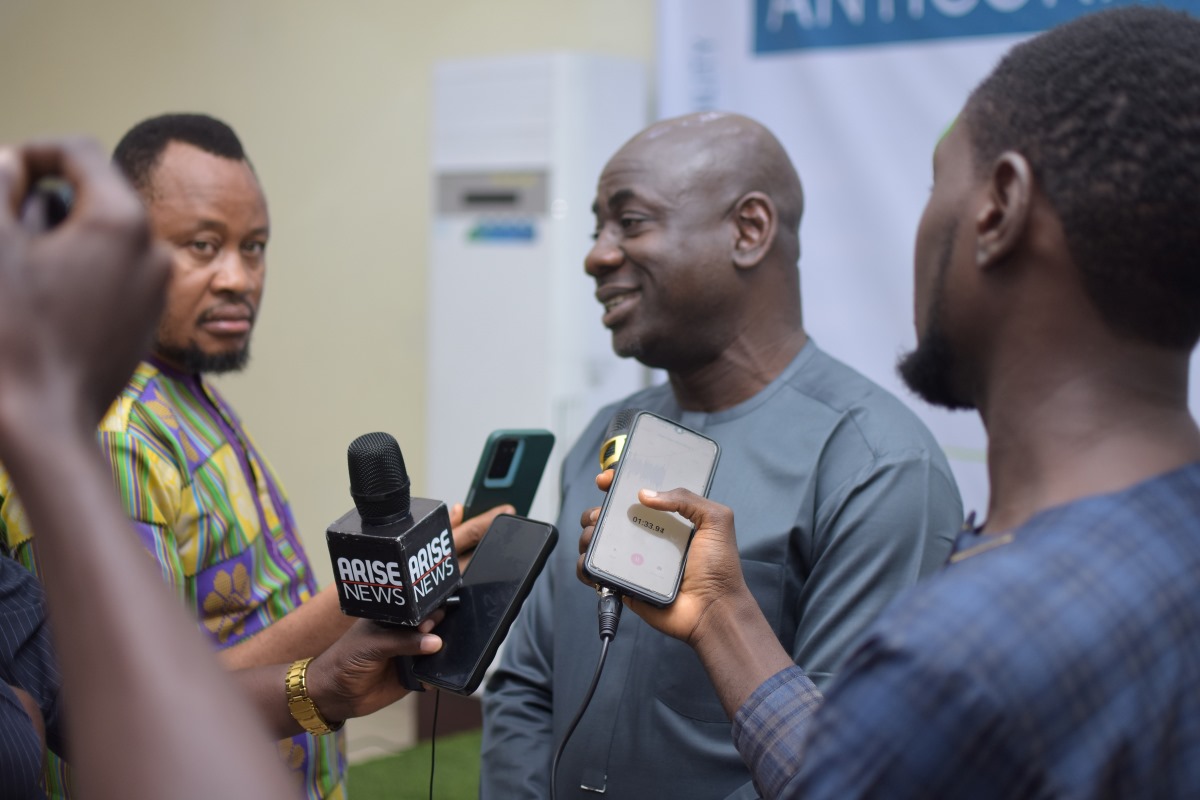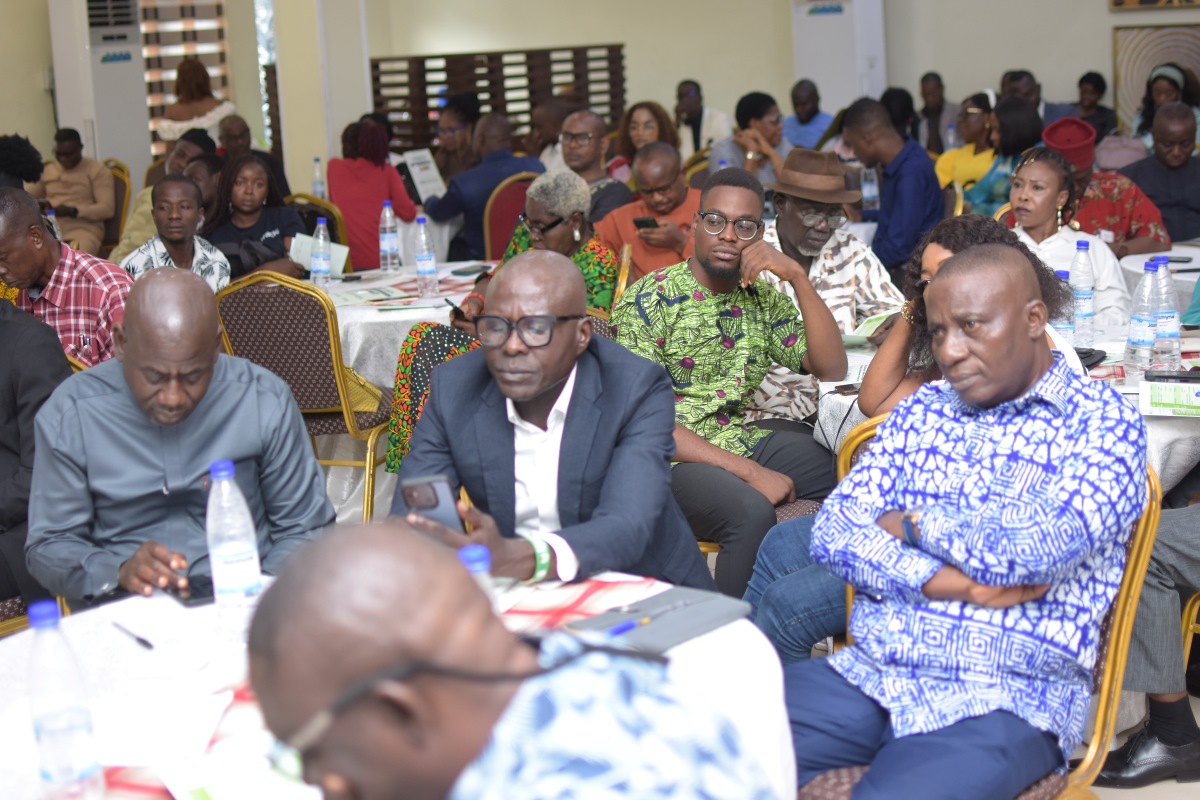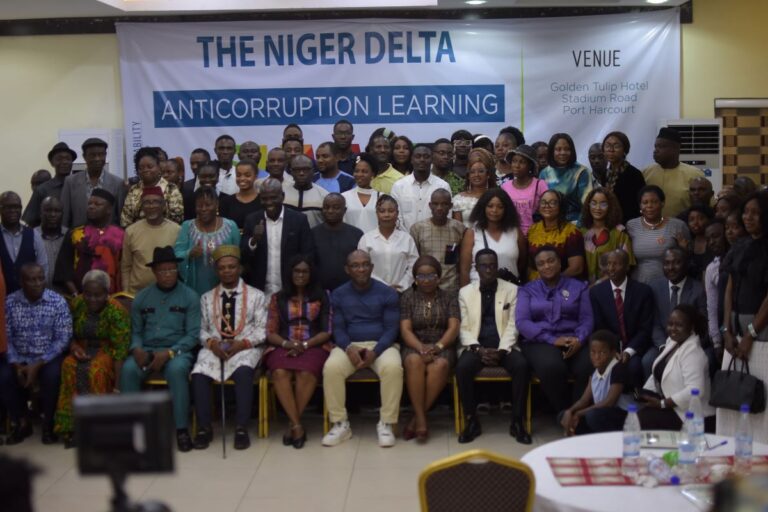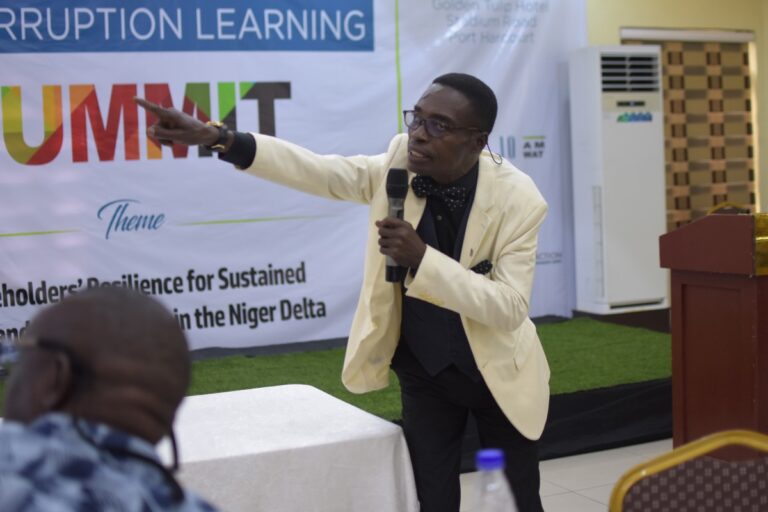Enough is Enough: Building People Power for Accountable Governance
Welcome Address by the Director of Social Action Nigeria, Dr. Isaac ‘Asume’ Osuoka at the
Niger Delta Anti-Corruption Learning Summit 2025
Introduction
Distinguished guests, partners, and fellow citizens – on behalf of Social Action Nigeria, I welcome you all to the Niger Delta Anti-Corruption Learning Summit 2025 here in Port Harcourt. This gathering is a continuation of the effort to the scourge of corruption and chart a new course for accountability and people-centred development in the Niger Delta and Nigeria as a whole. I acknowledge the presence of our esteemed participants: representatives of government anti-corruption agencies, civil society organisations, community leaders, the media, and our partners. In particular, we thank the MacArthur Foundation for supporting this work. For all present here, your attendance today is a testament to our shared commitment to fighting corruption and restoring the dignity and prosperity of our people.
The Niger Delta’s Paradox: Poverty Amid Plenty
Ladies and gentlemen, we are convened in a region that exemplifies the tragic paradox of poverty amid plenty. The Niger Delta is one of the most polluted and economically marginalised areas in the world – devastated by the most reckless oil and gas exploitation ever seen. The Niger Delta is a perfect example of a state that denies protection to its people. Decades of extractive activities have yielded billions of dollars, but what do the ordinary people have to show for it? Unemployment is rampant, healthcare facilities and schools are grossly inadequate, clean water and safe roads are scarce – basic needs remain unmet. The infrastructural decay and social crisis we see in the Niger Delta today, from polluted creeks to abandoned projects, reflect an unacceptable reality: Nigeria’s oil breadbasket has been turned into an arena of neglect and despair.
Why, we must ask, does this paradox persist? The answer, in large part, is corruption. Misgovernance and graft have siphoned away the wealth of the Niger Delta and Nigeria, leaving our communities improvised despite our country’s vast public revenues. Poverty, youth restiveness, and social injustice are the direct by-products of a system that has allowed public resources to be captured by a few rather than invested in the wellbeing of the many. We are here today because we refuse to accept this fate. We are here to declare that this status quo must not continue.
State Capture and Political Godfathers
Permit me to address another critical dimension of the crisis: the capture of state institutions by political godfathers and their patronage networks, which they call “tructures”. Over the years, we have seen the rise of powerful individuals and cabals who dominate the political landscape of our states. These so-called godfathers capture state governments and treat public funds as their personal wealth, as though the state treasury were a private bank account. Once in power – whether directly in office or from behind the scenes – they allocate to themselves and their cronies the resources meant to serve millions of people.
With captured public funds, they pay and corrupt every institution right the the electoral commission and take control of the entire country. And we have people that clap for them
We are seeing a feudalistic hold on power that undermines democracy and development. We need not look far for examples. Right here in the Niger Delta, we witnessed former governors anoint his successor and then presume to dictate the affairs of the state from outside office. In Rivers State, for instance, it is on public record that a powerful ex-governor (now a federal minister) “chose” the sitting governor as his successor – as if the governorship were a chieftaincy title to be bestowed, not a public trust determined by the people. When the chosen successor attempted to assert independence, the machinery of loyalty swung into action: a majority of the State House of Assembly pledged allegiance to the godfather instead of the elected governor. This ultimately led to paralysis and chaos in the state’s governance. Such is the stranglehold of godfatherism – it subverts the will of the people and undermines the function of government.
This phenomenon is not unique to Rivers. Across Nigeria, we see similar patterns of state capture..
Furthermore, the rot extends to the local government level, which should be the closest tier of government to the people. Local governments have effectively been compromised and incapacitated by this same culture of corruption.
Let us be clear: Political godfatherism and the personalisation of public funds are an assault on our democracy. When a governor or any public official regards the state’s budget as a private ATM, they betray the public trust and mortgage the future of their people. We cannot build a prosperous society on the back of such blatant theft. The time has come to dismantle the cult of godfathers and replace it with a culture of accountability and service.
Democracy Without Accountability?
Fellow patriots, Nigeria returned to democratic rule in 1999 with high hopes that elected government would usher in an era of transparency, accountability, and people-centered development. We believed that having the vote would empower citizens to demand good governance. We have had changes of ruling parties at the federal level and in some states, and numerous elections at all levels. But rather than accountability strengthening over time, it often seems to weaken. Budget after budget is passed, yet project after project is left unexecuted while public funds vanish. Corruption has become more brazen when it should have been curtailed by democratic checks and balances.
Social Action’s experience in the field of budget monitoring bears out this troubling trend. Since 2008, through the Niger Delta Citizens and Budget Platform (NDCBP), we have been tracking and reporting on how budgets in Niger Delta states are implemented. Sadly, our findings over the years have been depressingly consistent: allocations declared on paper but not delivered in reality, and outright looting of public funds with impunity. As far back as 2008, our citizen budget reports (such as the “Carry Go” report) documented widespread corruption and mismanagement of public funds in state and local budgets. We found, for example, that even in a year of oil boom when Niger Delta states received unprecedented revenues, those funds were not translated into economic development. Instead, huge portions of state budgets were devoted to the frivolities of the governing elite – in 2008, Akwa Ibom State spent over 23% of its entire budget on the Governor’s office, Bayelsa spent 8% on its Government House, alongside massive “security votes” under the governors’ sole control. Meanwhile, key sectors like health and education were starved of funds, and even where money was budgeted for public services, actual implementation was woefully inadequate. In plain terms, money was allocated but nothing got done – the funds disappeared.
Year after year, our analyses (Carry Go, Beyond Amnesty, Spend and Borrow, Counting the Votes, Wasted Billions, Pardoning Impunity, and other reports) have highlighted the same pattern: budgets inflated with wasteful expenditures for politicians, meager investment in real development, and an alarming execution deficit where even the limited development projects are not completed.
Democratic forms without democratic substance have allowed a class of rulers to enrich themselves while the masses continue to suffer.
Indeed, many Nigerians now ask: What is the meaning of democracy if it does not deliver accountable governance? We celebrate transitions of power, but the “power” rarely seems to truly belong to the people. This is democracy without accountability, and it cannot stand. If the people continue to see democracy as just an elaborate stage play that doesn’t improve their lives, public confidence in our system will erode dangerously.
Our task, therefore, is to insist that democracy must be made to work for the people. Accountability must be entrenched at all levels – from the State House in Abuja to the remotest local council. And if those in authority fail to hold themselves accountable, then we the people must do it. That is the essence of this summit and the anti-corruption movement we are building.
Building Resilient Institutions
One of the key solutions to the crises we face is the creation of resilient institutions at all levels of government. By “resilient institutions,” I mean public institutions that are strong, transparent, and immune to capture by corrupt interests. Personalities will come and go, but institutions – if well-designed and protected – can ensure continuity of good governance and rein in the excesses of individuals.
We need institutions that do not bend to the whims of a powerful governor or president. We need budgeting and procurement processes that are transparent and automatically subject to public oversight, regardless of who is in office. We need an independent judiciary that will faithfully enforce anti-corruption laws and sanction offenders no matter how highly placed. We need robust auditing and oversight agencies that can track every Naira of public money and expose misappropriation. In short, we must fortify the checks and balances that make corruption difficult and accountability the norm.
Yet, my friends, while institutions are crucial, they alone are not enough. Paper laws and agencies mean little if they are not backed by the active engagement of the people. This brings me to the next essential piece of the puzzle: citizen action.
The Power of Citizen Action
Every meaningful change in history has come, not just from top-down reform, but from bottom-up pressure. Citizen action and demand-making are indispensable in the fight against corruption. We, the people of Nigeria, cannot sit back and expect officials to suddenly become altruistic or for corruption to fix itself. We must be the drivers of change.
Citizen action means community members monitoring projects in their neighbourhoods, insisting that the health centre is actually built and staffed, that the water borehole actually provides water and is not just a photo-op. It means ordinary people feeling empowered to ask their leaders: “Where did the money go? Why is our road still bad when funds were allocated? Show us the accounts.” It means using tools like the Freedom of Information Act to obtain public records and expose wrongdoing. It means protecting and encouraging whistleblowers who come forward with information on graft. And it certainly means that civil society groups, the press, students, professionals, and religious bodies all raise their voices consistently for accountability.
And importantly, let us as citizens reject the culture of celebrating ill-gotten wealth. We must stigmatise, not admire, those who flaunt riches stolen from the public purse. In our communities, let corrupt politicians know they are not welcome to come and take chieftaincy titles or church honours while their people starve. Citizen action means changing the norms – to celebrate honest public service and shame corrupt enrichment.
And citizen action must also translate to citizen votes – which leads to the critical issue of electoral justice.
Beyond Reforms: The Fight for Electoral Justice
Fellow Nigerians, we can strengthen institutions and mobilise citizens, but if we ignore the arena of elections, we would be treating the symptoms and not the disease. Ultimately, who wields political power in a democracy is decided (or should be decided) by the people’s votes. Electoral justice is essential to accountability. If votes do not count, then leaders are not accountable to voters – and the cycle of corruption continues unabated. Thus, we must confront the hard truth: despite numerous polls since 1999, too often the will of the people has been subverted during elections.
We have witnessed elections marred by vote-buying, ballot-box snatching, voter intimidation, and falsification of results.
Therefore, while we demand institutional reforms, we must simultaneously fight for free, fair, and credible elections.
Social Action’s first budget report in 2008 (Carry Go https://saction.org/carry-go/) concluded presciently that fixing public resource management “would involve major restructuring of governance systems, including major electoral reforms aimed at restoring suffrage to the citizens”. In essence, the report noted that unless we restore the sanctity of the vote, mismanagement of resources would continue. That was in 2008 – here we are in 2025, and that warning is more urgent than ever.
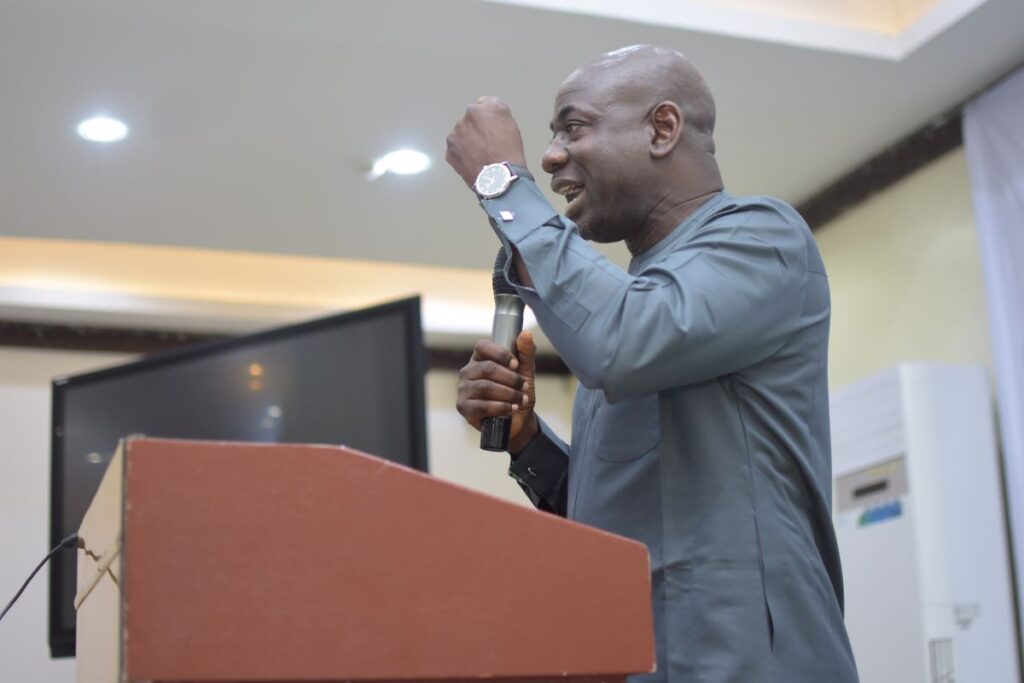
A Crisis in Rivers State: Warning for the Nation
Rivers State is a cautionary tale. It shows how godfatherism can escalate into a full-blown constitutional crisis. It shows the ultimate price of the politics of impunity – the disenfranchisement of an entire state’s electorate. Let’s remember: the people of Rivers went to the polls to elect a governor and legislators. But due to power-hungry actors, today those elected officials are out of office under an emergency decree, and the mandate of the people is effectively nullified. This is nothing short of a democratic tragedy.
If such a collapse can happen in Rivers – a state that is economically strategic, hosting the oil industry and the treasure base of the nation – it could happen elsewhere. We must not view Rivers in isolation. If Rivers State’s democracy collapses, it sets a precedent that could unravel democracy across Nigeria. We cannot let the Fourth Republic go the way of the Second. The integrity of Nigerian democracy as a whole is at stake in how this Rivers crisis is resolved.
So I call on all stakeholders: the Federal Government, political leaders, and civil society – resolve the Rivers crisis with utmost urgency and fairness. The emergency must not become a pretext for authoritarian control; rather it should be a short-term measure with a clear plan to restore elected government and the rule of law. The root causes – godfather interference, disloyal security apparatus, breakdown of legislative independence – must be addressed head-on. And for us in civil society, Rivers is a rallying cry to intensify our demands for political accountability and reform. We must ensure that what happened in Rivers serves as a turning point – a lesson that prompts reforms, not the first domino in a democratic collapse.
Conclusion: Our Collective Call to Action
In conclusion, distinguished ladies and gentlemen, this welcome address is more than just a formality – it is a call to action for all of us gathered here and all who are listening beyond these walls. The challenges I have outlined are enormous, but not insurmountable.
Today, I urge each one of us to leave this summit with a renewed determination to act. We must become, all of us, activists for accountability in our various capacities. Whether you are a government official, a civil society leader, a community youth, a traditional ruler, a journalist, or a concerned citizen – Nigeria needs you to push for change with boldness and persistence.
As we proceed with the summit’s learning sessions and the unveiling of the Citizens Report on Constituency Projects, let us share strategies, learn from each other, and commit to concrete next steps. This cannot be just a “talking” summit – it must be a springboard for action.
Finally, I want to remind us that this fight is not a sprint but a marathon. There will be pushback. Those who profit from the old ways will not surrender quietly. We may face intimidation or setbacks. But we must remain resilient and steadfast. We owe it to the tens of millions of our compatriots living in poverty; we owe it to the next generation who deserve a Nigeria that rewards talent and hard work, not nepotism and theft. We owe it to the memories of the heroes past who fought for this country’s freedom and unity, to ensure that their sacrifices were not in vain.
I welcome you once again to this summit. Let the conversations be frank, let the learning be rich, and above all, let the outcome be action – bold, transformative action. As we say in the activist community: Enough is enough! The time for change is now.
Thank you all for coming, and for your attention.
Thank you, and God bless the Niger Delta. God bless the Federal Republic of Nigeria.

